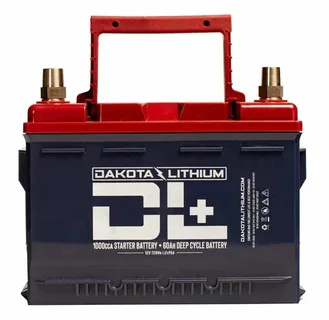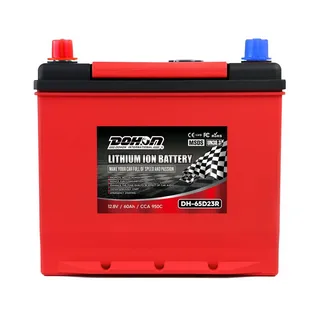Are you ready to take your boating experience to the next level? Consider investing in a lithium starter battery boat. Lithium-ion batteries are revolutionising the marine industry with their advanced technology and superior performance. In this blog post, we will explore the benefits of lithium-ion batteries for boating, from trolling batteries to starter batteries and everything in between.
Understanding Lithium-ion Batteries in Marine Applications
Lithium-ion batteries have carved a niche in the marine sector due to their unique characteristics. Unlike traditional batteries, they possess a high energy density, which translates into a longer power supply duration without necessitating frequent recharges. This is particularly beneficial in marine applications where reliability and endurance are paramount. Their rapid charging capability ensures boaters can quickly get back on the water with minimal downtime. Another significant advantage is their reduced weight.
In marine settings, where every ounce matters for optimizing performance and fuel efficiency, the lightweight nature of lithium-ion batteries offers a distinct edge over heavier alternatives. Their ability to deliver consistent power output supports the smooth operation of trolling motors and essential onboard electronics, ensuring a steady and reliable energy source for navigation, safety systems, and recreational use. This adaptability and efficiency make lithium-ion batteries an ideal choice for various marine applications, from leisurely sailing to competitive angling, providing boaters with an unmatched combination of performance, convenience, and peace of mind.
Selecting the Right Lithium Trolling Battery
Choosing the ideal lithium trolling battery for your boat hinges on understanding your vessel’s specific needs and the conditions under which you’ll operate. Begin by assessing the capacity required to power your boat efficiently. This involves considering the amperage hours (Ah) needed to run your trolling motor for the duration of your fishing or boating trips without the risk of running out of power prematurely. The battery’s voltage should match or exceed the requirements of your trolling motor to ensure efficient power delivery.
Another critical aspect is the physical size and weight of the battery, as space and weight distribution are crucial factors in marine settings. Opt for a battery that fits well within the designated space on your boat and contributes to an optimal weight balance. Furthermore, understanding the battery’s discharge rate is vital, affecting how long it can power your trolling motor at a given load. By carefully considering these factors, you can select a lithium-ion trolling battery that not only meets the power requirements of your trolling motor but also enhances your boating experience by providing reliable, long-lasting power.
The Advantages of Lithium-ion Starter Battery Boat
The benefits of utilizing a lithium-ion starter battery in a boat are substantial, beginning with the significant weight reduction. This lightness contributes to better fuel efficiency and easier handling, a marked improvement over the bulkier lead-acid counterparts. Additionally, these batteries offer remarkable longevity, outlasting traditional batteries for years due to their ability to sustain hundreds of charging cycles without a substantial decrease in capacity. This longevity is cost-effective and reduces the environmental impact by necessitating fewer battery replacements over time. Another compelling advantage is the quick charging capability of lithium-ion batteries.
Boaters can significantly minimize downtime between outings, as these batteries recharge much faster than lead-acid batteries. This particularly benefits those who spend considerable time on the water and require frequent recharges to power their adventures. Moreover, lithium-ion starter batteries provide a more stable and reliable power source, ensuring engines start quickly and efficiently every time. This reliability enhances the overall safety and convenience of boating, allowing boaters to focus on enjoying their journey rather than worrying about battery performance. With these substantial benefits, lithium-ion starter batteries present a transformative option for boaters seeking enhanced performance and reliability.
 Key Features of Top-Performing Lithium Trolling Batteries
Key Features of Top-Performing Lithium Trolling Batteries
Lithium trolling batteries offer rapid charging and discharging rates for marine enthusiasts who value convenience and efficiency. This swift energy transfer is instrumental in quickly powering your trolling motor and facilitating smoother and faster rides across the water. These batteries have an exceptional cycle life, guaranteeing multiple years of optimal performance.
High Energy Density
Top-tier lithium-ion trolling batteries boast a high energy density, which means they can store more energy in a smaller space. This feature is crucial for maximizing efficiency and endurance during long fishing trips or extended periods on the water, ensuring that anglers and boaters have ample power without the bulk.
Built-in Battery Management System (BMS)
A distinguishing feature of leading lithium-ion trolling batteries is the inclusion of an integrated Battery Management System. This technology plays a pivotal role in monitoring the battery’s health and regulating temperature, voltage, and current, significantly enhancing safety, performance, and longevity.
Low Self-Discharge Rate
Unlike other types of batteries, lithium-ion variants have a meager self-discharge rate. This means they retain their charge for much longer when not in use, making them ready for action without frequent recharges, which is ideal for boaters who don’t hit the water daily.
Durability and Reliability
The best lithium-ion trolling batteries are designed to withstand harsh marine environments. They resist vibrations, shocks, and temperature fluctuations, ensuring reliable performance and durability even under challenging conditions.
Eco-Friendly and Maintenance-Free
These batteries are efficient and eco-friendly, with no hazardous emissions during use. Additionally, they are virtually maintenance-free, requiring no water top-ups or regular acid checks, providing boaters with a hassle-free, clean, and adequate power source for their trolling motors.
Maintenance Tips for Lithium-ion Marine Batteries
Maintaining your lithium-ion marine batteries is essential for ensuring their peak performance and extending their lifespan. One foremost step is keeping the battery terminals and connectors clean and corrosion-free. A mixture of baking soda and water can clean any corrosion effectively. It’s crucial to regularly check the battery’s state of charge and avoid depleting it completely, as doing so can diminish its capacity over time. A routine charging schedule, even when the battery is not in heavy use, will help maintain its optimal condition.
Ensuring the batteries are securely mounted and protected from excessive movement or vibrations will prevent physical damage and potential internal short circuits. To avoid overcharging, use a charger specifically designed for lithium-ion batteries, which includes an automatic shut-off feature once the battery reaches full charge. Finally, if you’re storing your battery for an extended period, ensure it is partially charged and stored in a cool, dry place to minimize the risk of capacity loss. Adhering to these simple yet effective maintenance tips will keep your lithium-ion marine batteries in top condition, ready for your next boating adventure.
Safety Considerations for Lithium Trolling Motor Battery
When it comes to leveraging the power of lithium trolling motor battery, prioritizing safety is essential. It’s vital to ensure that these batteries are not subjected to extreme temperature fluctuations, as excessive heat and cold can significantly impact their performance and longevity. Furthermore, to prevent potential hazards, never attempt to charge a lithium-ion battery with a charger not designed explicitly for its chemistry. Overcharging can lead to overheating and, in rare cases, thermal runaway, where the battery could catch fire or explode.
Always adhere to the manufacturer’s recommended charging practices and use chargers that automatically cut off when the battery is fully charged to avoid these risks. Additionally, physical damage to the battery, such as punctures or severe impacts, should be avoided to prevent internal short circuits that could compromise safety. Installing a battery management system (BMS) can provide an added layer of security by monitoring the battery’s condition and preventing operations outside its safe operating parameters. By following these guidelines, you can safely enjoy the benefits of lithium-ion batteries on your boating adventures.
The Cost-Benefit Analysis of Lithium-ion Batteries for Boating
When evaluating the economic implications of adopting lithium-ion batteries for boating, the initial price tag is undeniably higher than that of traditional lead-acid batteries. However, several vital financial advantages mitigate this upfront investment over time:
- The longevity of lithium-ion batteries far exceeds that of lead-acid batteries, meaning less frequent replacements are needed, translating into cost savings—
- The higher energy efficiency reduces energy consumption for charging, further lowering operational costs. The rapid recharge capability of lithium-ion batteries also means more time spent on the water and less downtime waiting for recharges, potentially increasing the utility and enjoyment derived from boating activities.
- The lightweight nature of these batteries can lead to fuel savings by contributing to a lighter overall boat weight, enhancing fuel efficiency.
Hen these factors are considered together, the long-term savings and benefits often justify the initial higher expenditure on lithium-ion batteries, presenting a compelling case for their adoption by boating enthusiasts seeking to optimize their experience and investment in marine activities.
Choosing a Lithium Trolling Motor Battery 24V for Enhanced Performance
In terms of cost-effectiveness, lithium-ion batteries provide a substantial advantage. While the initial purchase price may be higher, these batteries’ long lifespan and reliable performance make them a valuable investment in the long run. They offer significant energy storage capabilities, which are beneficial for larger boats or more power-intensive marine applications.
Voltage Compatibility
First and foremost, ensure that the lithium trolling motor battery 24V aligns perfectly with the voltage requirements of your trolling motor. This compatibility is crucial for maintaining optimal performance and preventing potential damage to your engine.
Capacity Assessment
Analyze your typical usage patterns to determine the appropriate battery capacity, measured in ampere-hours (Ah). A higher Ah rating indicates a longer run time, making your trolling motor more efficient for longer excursions or intensive use.
Size and Weight Considerations
Evaluate the physical dimensions and weight of the 24V lithium-ion battery to ensure it fits within the designated space on your boat. The advantage of lithium-ion technology is its compact and lightweight nature, contributing to better weight distribution and overall boat performance.
Durability in Marine Environments
Opt for a battery that offers robust protection against the harsh marine environment. Features to look for include waterproof casings and resistance to shock and vibration, ensuring the battery’s longevity and reliability.
Integrated Protection Systems
Choose a battery with an advanced Battery Management System (BMS) to safeguard against overcharging, over-discharging, and short-circuiting. This system enhances the safety and efficiency of your battery, providing peace of mind during your boating adventures.
Conclusion
Upgrading to a lithium starter battery boat improves boating significantly, offering a light, efficient, and reliable power source. Choosing the correct battery for your boat and following maintenance guidelines enhances performance and longevity, ensuring enjoyable and dependable voyages. With lithium-ion starter batteries, you can also rest assured about the consistency of the power supply even in fluctuating temperatures, allowing smooth and worry-free operation. Additionally, their fast recharging capabilities mean less time spent docked and more time exploring the open waters.
FAQs
Q: What are the main benefits of upgrading my boat to a lithium-ion battery?
A: Upgrading to a lithium-ion battery offers several advantages, including longer battery life, faster recharging times, reduced weight, and improved efficiency and performance for starter and trolling motor applications.
Q: What should I consider when choosing a lithium trolling battery for my trolling motor?
A: Key considerations include ensuring the voltage matches your lithium trolling battery, understanding the battery’s ampere-hour (Ah) rating to meet your usage needs, checking the physical size for fitment on your boat, and choosing a battery with a built-in Battery Management System (BMS) for safety and longevity.
Q: How can I maintain my lithium-ion marine battery to ensure longevity?
A: Regular maintenance includes keeping the battery terminals clean, avoiding complete discharge, following a routine charging schedule, ensuring the battery is securely mounted, and using a compatible charger to prevent overcharging.
| Other Good Articles to Read |
| Blogs-Peoples |
| Bryan Smith Blogs |
| intellect blogs |
| the fault in our blogs |
| blogs eu |
| oz forums |
| recruitment blogs |
| zet blogs |
| id blogs |
| Blog Studio legale |
| blogs map |
| Related Business Listings |
| Contact Directory |
| Local Business Profiles |



